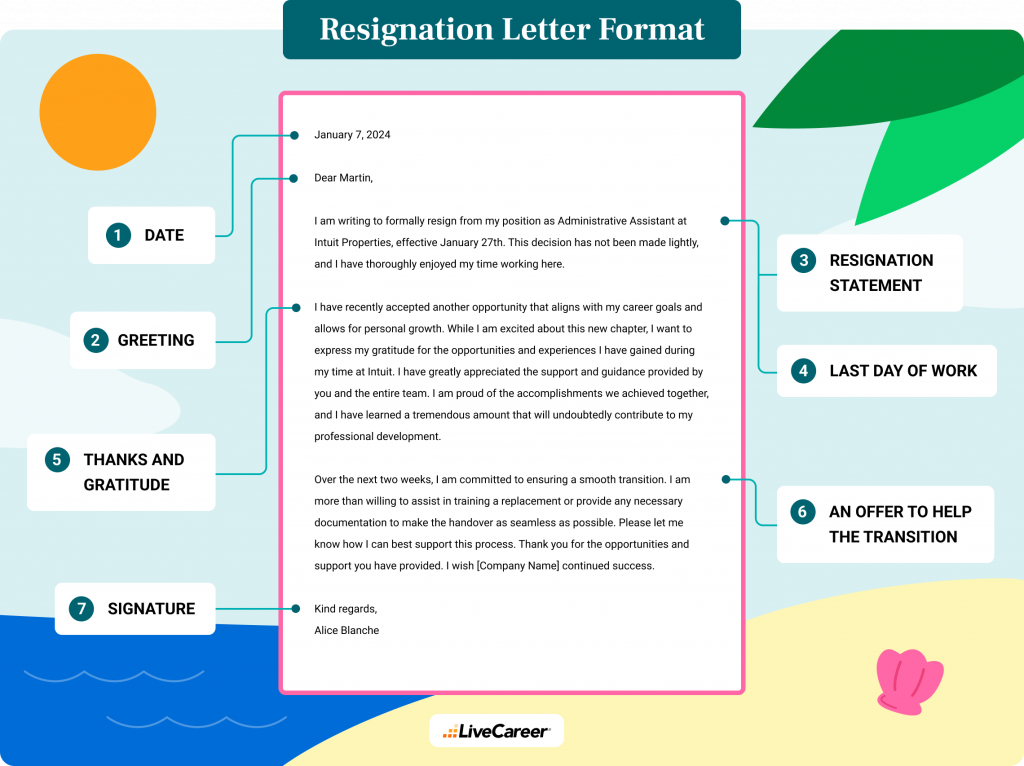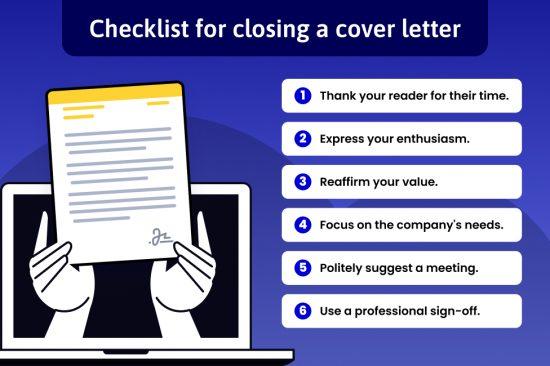How to Write a Resignation Letter ( Examples)
A letter of resignation can help you leave a job while keeping doors open for future recommendations. Here, we’ll explain how to write a resignation letter and provide a template, plus examples for common jobs and scenarios.
Leaving a job—whether it’s for a better opportunity, a career change, or personal reasons—can be stressful. However, a professional resignation letter helps ease that transition by providing a clear, professional way to step away from your role on good terms.
In this guide, we’ll walk you through how to write a letter of resignation that’s respectful, effective, and tailored to your situation. You’ll find real examples, expert tips, and common mistakes to avoid that will help you move forward with confidence and professionalism.
Resignation Letter Example
Check out this sample resignation letter infographic for an overview on what sections you must include in your letter of resignation to make a smooth transition.

A well-written letter of resignation should include:
- Date
- Greeting
- Resignation statement
- Last day of work
- Thanks and gratitude
- An offer to help the transition
- Signature
Letter of resignation template that you can copy/paste:
[Month] [Day], [Year]
Dear [Your Boss’ Name],
Please accept this formal notice that I am resigning from my role as a [position title] with [Company Name]. My last day will be [last date you can work, usually two weeks minimum from today’s date]. This decision has not been made lightly, and I am sincerely grateful for my time at [Company Name], thank you.
The past [length of time you’ve had this job] have taught me a lot and helped me grow professionally. In particular, I appreciated the chance to [a few of your favorite job achievements or responsibilities]. I’ve learned [mention specific things you learned from this job]. I will carry these lessons and skills into future projects.
I’d like to do everything possible to help the team transition and wrap up my duties in these next two weeks. Please let me know if there’s anything I can do to make this adjustment smooth. I wish the company continued success and hope to keep in touch.
Gratefully,
[Your Name]
Once you’ve copied and pasted this free resignation letter template into an email or document, make sure you personalize it with your unique details.
How to Write a Resignation Letter
Now, we’ll explain the key steps for writing a resignation letter that’s professional, concise, and includes all the necessary information the employer needs.
1. Date
Follow the proper resignation letter format by including the date at the top, so that it’s clear when you’re giving notice. The professional standard for resignation letters is offering two-weeks notice before your last day; however, this isn’t a strict rule in every case.
2. Greeting
Address your resignation letter to your direct supervisor or a human resources manager.
If you are familiar with the person receiving the letter, you can use their first name or address them how you usually do. If you haven’t spoken before, use the general salutation for business letters, meaning the person’s first and last name (“Dear Gina Snipes”).
You may also write a letter to your team, department or organization. However, before you announce your departure to a group, ensure you’ve notified your supervisor separately first!
If you're unsure of the proper greeting, review our guide on how to address a cover letter to choose the right salutation for your situation.
3. Resignation statement
The first paragraph of your letter of resignation should clearly state your intention to resign, your job title and the company by name.
Though not necessary, some people share the reasons for their departure if they’re positive; for instance, returning to school or an exciting opportunity to further their careers.
Resignation statement example:
“It is with a heavy heart that I tender my resignation as a paralegal here at Johnson & Wolfram. After much thought, I have decided that I would like to pursue a career in SEO, which aligns with my passion for technology and information architecture.”
4. Last day of work
Letting an employer know how long they can expect your service greatly helps them plan how the business will operate without you.
Again, two weeks notice is standard. If you give less than two weeks’ notice, put the resignation letter’s date in bold so that it jumps out and the employer knows they should get planning.
5. Thanks and gratitude
Show thanks for the opportunity, share the professional skills you’ve developed or how you appreciated the chance to have worked with your boss and coworkers. Including this brief statement of gratitude helps you nurture the connection between the employer and yourself. Never burn bridges in your professional life!
Resignation letter gratitude example:
“I’m thankful for the opportunity I’ve had these past two years working closely with you and our incredible team. It’s taken my customer service skills to the next level and helped me grow professionally.”
6. An offer to help the transition
Here, you can offer your employer any help that could make the transition of your departure run smoothly.
A simple offer of assistance shows that you care about the business, your teammates and your work. And that you hope business will flourish after you’re gone.
It will also imply that you plan on being responsible and working hard until the very last day of your work.
Offer to help example:
“Please let me know how I can help in any training or transitioning my exit requires.”
7. Signature
To end your letter, use a professional salutation like “Kind regards,” “Respectfully,” “Sincerely,” or “Thankfully,” and then include your full name and job title.
Suppose you want to keep in touch with your manager after you leave. In that case, providing your phone number or suggesting connecting on LinkedIn, Instagram or Facebook is also acceptable.
Resignation letter signature example:
Kind regards,
Belinda Markins
Sr. Product Designer
P.S. I hope to stay in touch after working together. Please feel free to add me on LinkedIn or call me at (555) 555-5555.
Resignation Letter Mistakes to Avoid
When writing your resignation letter, keep things professional, respectful, and focused. Avoid these common mistakes:
- Using the resignation letter to vent frustrations: Don’t air grievances about your manager, team, or work environment.
- Criticizing the company: Your letter of resignation isn’t the place for feedback or complaints.
- Sounding overly excited to leave: Avoid language that makes you seem relieved or thrilled to be quitting.
- Mentioning your new employer: There’s no need to reference where you’re going next; keep it concise and focused on your goodbye.
- Being vague about your last working day: Clearly state your intended final day of employment.
- Getting emotional or overly personal: Stay calm, clear, and professional in tone.
- Using informal language or formatting: Keep your letter polished and businesslike.
- Forgetting to say thank you: Even if the job wasn’t ideal, expressing appreciation helps preserve goodwill.
- Submitting the letter without a plan: Resign only after you know what’s next, whether it’s a new job, school, or time off.
Before you submit your resignation letter, make sure you’ve established an exit game plan. If your situation permits it, you’d ideally want a job offer lined up or at least promising job interviews. However, if you must exit without a professional safety net, start updating your resume and cover letter to prepare for your job search.
Resignation Letter Examples
Looking at examples can make writing your resignation letter much easier. Below, you’ll find sample resignation letters tailored to specific situations and job types. We’ve also included text-only versions you can copy and customize to fit your needs.
Simple resignation letter sample
This simple resignation letter is a no-fuss option that works for any job title, industry, and scenario.
Resignation letter with reason sample
This sample letter of resignation will help you leave your role while stating your reasons in a professional manner.
Two-week notice resignation letter sample
Click on this two-week notice letter of resignation example to customize your own letter with the help of our Builder.
Effective immediately resignation letter sample
If you need to resign immediately, review this example resignation letter before submitting your own. Ensure you leave on good terms with your employer.
Short resignation letter sample
A short and concise letter of resignation is more than enough to get your message across in a polite way. If you’re not one to dive into details, use this brief yet formal resignation letter as inspiration.
Teacher resignation letter sample
Although this is specifically a teacher resignation letter example, it can still give you an idea of how to say goodbye while sharing some context about your role and accomplishments.
In addition, here are some well-written resignation letter samples that you can copy and paste and customize with your information:
Resignation letter example #1:
Jan. 8, 2024
Dear Amanda,
This letter is to inform you that I am resigning from my position as senior product designer at Lightseeker Technologies, effective January 30th.
The past four years with Lightseekers have been immensely enriching and essential to my life and professional development. I’m grateful for all the guidance and support you’ve given me and the chance to be part of such a dynamic and fantastic team.
Please let me know how I can help during the transition period. I wish you and our whole team all the best.
Sincerely,
Tyrone Biggs
P.S. I hope that we can stay in touch. So, I requested a connection on LinkedIn, and you have my number, so feel free to reach out if you ever want to grab a coffee!
Resignation letter example #2:
Nov. 29, 2023
Dear Tony,
With a heavy heart, I tender my resignation as the account manager for Manley Motors. My last day will be on December 22.
The past eight years have been a wonderful experience. I appreciate the opportunities you’ve given me to learn and grow, and I value all of the professional relationships I’ve been able to cultivate here.
Please let me know if there is any way I can assist with the transition. And I hope we stay in touch!
Kind regards,
Nate LePine
Key Takeaways
To recap, here are the main points you need to know for how to write a letter of resignation:
- Address the resignation letter to your immediate supervisor.
- Right away mention that the letter of resignation’s purpose is to inform them of your exit.
- Cite your job title and your company name.
- Mention why you’re leaving only if it’s for positive reasons, e.g., education, family or professional growth.
- Thank the employer for the opportunity to work for them.
- Mention your favorite things about working for their company or how it helped you grow.
- Offer to help make your transition out of the company seamless and easy.
- Sign off politely.
- Encourage the manager to stay in touch if it feels appropriate!
Frequently Asked Questions
What is a resignation letter?
A resignation letter is a formal document that informs your employer of your decision to leave your job. It typically includes what your final working day will be, a brief thank you, and should convey a polite, professional tone.
Do I have to write a resignation letter?
While not legally required, many employers expect a written resignation as part of standard company policy. A resignation letter is also a professional courtesy that helps you leave on good terms. Submitting a letter of resignation gives both you and the employer leave things clearly, plus if any legal issues arise, it’s documented proof of your decisions and the transition timeline.
When should I submit my resignation letter?
Submit your resignation after you’ve spoken with your manager and finalized your decision to leave. Ideally, give at least two weeks’ notice unless your contract says otherwise.
What should I include in my resignation letter?
Your letter should follow the standard business letter format, and include your intended last day of work, a short statement of resignation, a note of thanks, and an offer to help with the transition.
Should I say why I’m quitting?
Mentioning the reasons you’re quitting in your letter of resignation is optional. You can mention a general reason (like “a new opportunity”) if you wish, but you don’t need to explain in detail, especially if the reasons are negative.
Can I send my resignation letter by email?
Yes, you can send your letter of resignation via email, especially if you work remotely. Ensure you create a separate document for your resignation letter, and attach it to the email with a subject and brief message. However, if you work on-site or in a formal setting, handing in a printed letter is often more appropriate after a verbal conversation.
Is it OK to quit without another job lined up?
You can resign without another job, but it’s wise to have a plan in place for your financial wellbeing as well as your career path before you move on from the job.
Can I take back my resignation?
In some cases, you can take back your resignation if your employer hasn’t filled your position and is open to keeping you. Reach out quickly and professionally if you change your mind. Be aware that doing so might make you look indecisive, so be emphatic about your choice when approaching your employer.
Why is it important to stay professional in a resignation letter?
Your resignation letter leaves a lasting impression. Staying polite and professional protects your reputation and increases the chances of a positive reference in the future. If you’re leaving because of a personal fallout with a boss or coworker, or an unfortunate situation, don’t bring up those topics in your letter. Just keep it brief and focused on key details: your statement of resignation and your last day of work.















